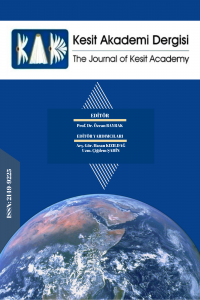ANADİLİ ALMANCA OLAN BİR STAJYER ÖĞRETMEN TARAFINDAN UYGULANAN ALMANCA KONUŞMA SAATİ ETKİNLİĞİ HAKKINDAKİ ALMANCA ÖĞRENCİLERİNİN GÖRÜŞLERİ
Almanca Öğretmenliği bölümüne kayıtlı öğrenciler, Yabancı Diller Yüksekokulunun hazırlık sınıfında Almanca konuşma problemi yaşamaktadırlar. Duygu ve düşüncelerini yabancı bir dilde ifade etmekte zorlanmaktadırlar. Böylece, yabancı dilde konuşamamaktan şikayet edilmektedir. Bu amaçla, öğrencileri konuşmaya yönlendirmek, konuşma becerisi ve alışkanlığı kazandırmak, onları konuşmaya cesaretlendirmek ve öğrendiklerini uygulamaları için anadili Almanca olan ve Türkçe bilmeyen Üniversitemizde Erasmus kapsamında staj yapan öğretmenle sınıf dışında Almanca konuşma etkinliği düzenlendi. Bu etkinlik, ders ortamından uzakta kampüs içi bir kafede ders kitabından bağımsız olarak toplam üç hafta her hafta 1,5 saat boyunca devam etmiştir. Bu etkinliğe, Almanca hazırlık öğrencilerinden 7 kişi düzenli olarak gönüllü katıldı. Etkinlik hakkında öğrencilerin genel görüşlerini ve algılarını öğrenmek için 30 soruluk anket hazırlanmıştır. Öğrenci mülakat soruları ise ankete paralel olarak yapıldı. Her konuşma etkinliğinden sonra Alman stajyer öğretmen tarafından alan notları tutulmuştur. Katılımcıların çoğu, Almanca konuşma saati etkinliğinde anadili Almanca olan bir öğretmen ile iletişim kurmanın Almanca konuşma becerilerini, dilbilgisi kullanımlarını ve kelime bilgilerini geliştirdiklerini söylemişlerdir.
Anahtar Kelimeler:
Yabancı Dil Öğrenimi, Konuşma Becerisi, Yabancı Dil Olarak Almanca Öğretimi, Almanca Hazırlık Sınıfı Öğrencileri, ders dışı etkinlikler
THE VIEWS OF TURKISH STUDENTS LEARNING GERMAN ABOUT THE SPEAKING HOUR ACTIVITY CONDUCTED BY GERMAN INTERN TEACHER
The students, who are enrolled at German Preparatory Language Programme at the School of Foreign Languages, lack German speaking skills. To address this problem, we’ve designed extra-curricular German speaking activities. An ERASMUS+ exchange staff a German trainee teacher of German as a foreign language conducted out-of-class German speaking activities once a week for three weeks in total. Each speaking activity is lasted for 1,5 hours per week. 7 volunteered students of German language preparatory programme attended the speaking activity regularly. The activity took place at a cafe in the university campus. Three data collection tools were used. A questionnaire, which is an adapted version of Sabo’s questionnaire, is applied. An interview is then held with each student on individual basis. The German trainee teacher took fieldnotes after each activity. Almost all students note that the opportunity to communicate in German enable them to improve their speaking skills, the use of grammatical rules and vocabulary.
Keywords:
Learning a Foreign Language, Speaking Skills, Teaching German as a Foreign Language, Turkish Learners of German Language, extracurricular activities,
___
- Lantolf, J. P., & Aljaafreh, A. (1996). Second language learning in the zone of proximal development: A revolutionary experience, International Journal of Educational Re- search, 23, 7, 619-632.
- Ohta, A. S. (2000). Rethinking interaction in SLA: developmentally appropriate assis- tance in the zone of proximal development and the acquisition of L2 grammar, Lantolf, J.P. (Ed.) Sociocultural theory and second language learning, 51-78, Oxford University Press.
- Ohta, A. S. (2001). Second Language Acquisition Processes in the Classroom. Lawrence Erl- baum Associates, Mahwah, NJ.
- Ohta, A. S. (2005). Interlanguage pragmatics in the zone of proximal development, Sys- tem, 33, 503-517.
- Shayer, M. (2002). Not just Piaget, not just Vygotsky, and certainly not Vygotsky as an alternative to Piaget, Shayer, M. (Ed.) Learning intelligence, cognitive acceleration across the curriculum from 5 to 15 years, Open University Press, UK.
- Vygotsky, L.S. (1962). Thought and Language, MIT Press, Cambridge, MA.
- Vygotsky, L.S. (1978). Mind in Society, Harvard University Press, Cambridge, MA.
- Williams, M., & Burden, R. (1997). Psychology for language teachers, a social constructivist approach, Cambridge University Press, UK.
- Wood, D. J., Bruner, J. S., & Ross, G. (1976). The role of tutoring in problem solving, Journal of Child Psychiatry and Psychology, 17, 2, 89-100.
- Başlangıç: 2015
- Yayıncı: Asos Eğitim Bilişim Danışmanlık San. Tic. Ltd. Şti.
Sayıdaki Diğer Makaleler
SPORDA ÇEVRESEL SÜRDÜRÜLEBİLİRLİK
ORTAÖĞRETİM ÖĞRENCİLERİNDE AKADEMİK BAŞARININ YORDAYICISI OLARAK YALNIZLIK VE YAŞAM DOYUMU
Hüseyin Hüsnü BAHAR, Dursun MERAL
KAYSERİ SİNDELHÖYÜK KASABASI’NDA HASIR DOKUMACILIK MAT WEAVING IN KAYSERİ / SİNDELHÖYÜK
AYTÜL AKAL’IN ESERLERİNDE AİLE İÇİ ÇATIŞMA ÜZERİNE BİR İNCELEME
Zübeyde ERKMEN, Ahmet İhsan KAYA
9 NUMARALI VARNA ŞER’İYYE SİCİLİNİN TANITIMI VE FİHRİSTİ
MEHMET TOPAL’IN KIBRIS’TA TÜRK OLMAK ADLI OYUNU ÜZERİNE
VİYANA SATIM SÖZLEŞMESİNİN UYGULAMA ALANI FIELD OF APPLICATION OF VIENNA SALES CONVENTION
